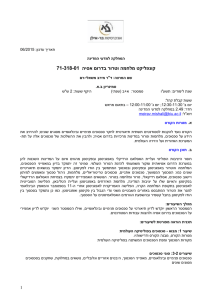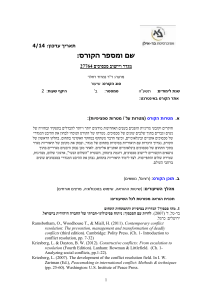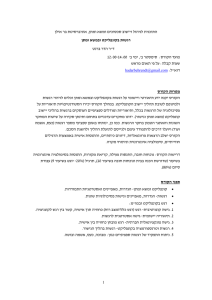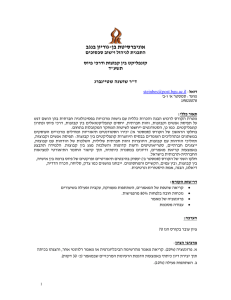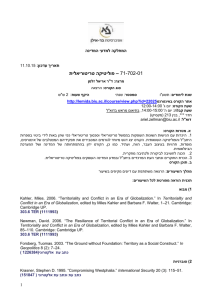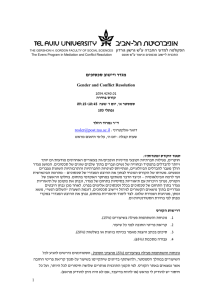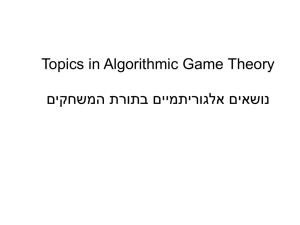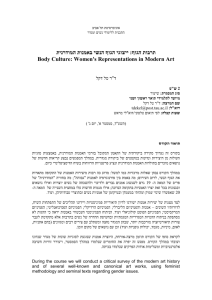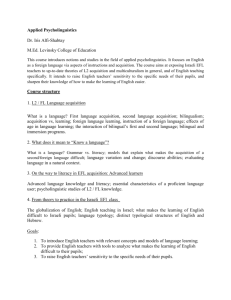מבוא לחקר סכסוכים
advertisement
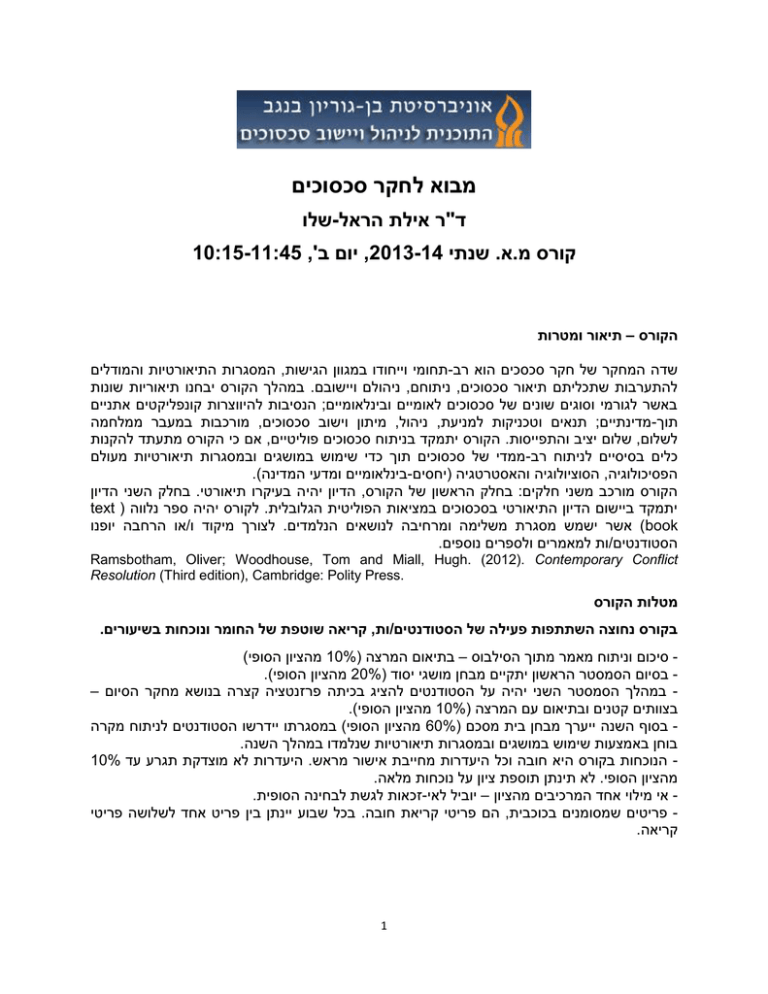
מבוא לחקר סכסוכים
ד"ר אילת הראל-שלו
קורס מ.א .שנתי ,2013-14יום ב'10:15-11:45 ,
הקורס – תיאור ומטרות
שדה המחקר של חקר סכסכים הוא רב-תחומי וייחודו במגוון הגישות ,המסגרות התיאורטיות והמודלים
להתערבות שתכליתם תיאור סכסוכים ,ניתוחם ,ניהולם ויישובם .במהלך הקורס יבחנו תיאוריות שונות
באשר לגורמי וסוגים שונים של סכסוכים לאומיים ובינלאומיים; הנסיבות להיווצרות קונפליקטים אתניים
תוך-מדינתיים; תנאים וטכניקות למניעת ,ניהול ,מיתון וישוב סכסוכים ,מורכבות במעבר ממלחמה
לשלום ,שלום יציב והתפייסות .הקורס יתמקד בניתוח סכסוכים פוליטיים ,אם כי הקורס מתעתד להקנות
כלים בסיסיים לניתוח רב-ממדי של סכסוכים תוך כדי שימוש במושגים ובמסגרות תיאורטיות מעולם
הפסיכולוגיה ,הסוציולוגיה והאסטרטגיה (יחסים-בינלאומיים ומדעי המדינה).
הקורס מורכב משני חלקים :בחלק הראשון של הקורס ,הדיון יהיה בעיקרו תיאורטי .בחלק השני הדיון
יתמקד ביישום הדיון התיאורטי בסכסוכים במציאות הפוליטית הגלובלית .לקורס יהיה ספר נלווה ( text
)bookאשר ישמש מסגרת משלימה ומרחיבה לנושאים הנלמדים .לצורך מיקוד ו/או הרחבה יופנו
הסטודנטים/ות למאמרים ולספרים נוספים.
Ramsbotham, Oliver; Woodhouse, Tom and Miall, Hugh. (2012). Contemporary Conflict
Resolution (Third edition), Cambridge: Polity Press.
מטלות הקורס
בקורס נחוצה השתתפות פעילה של הסטודנטים/ות ,קריאה שוטפת של החומר ונוכחות בשיעורים.
סיכום וניתוח מאמר מתוך הסילבוס – בתיאום המרצה ( 10%מהציון הסופי) בסיום הסמסטר הראשון יתקיים מבחן מושגי יסוד ( 20%מהציון הסופי). במהלך הסמסטר השני יהיה על הסטודנטים להציג בכיתה פרזנטציה קצרה בנושא מחקר הסיום –בצוותים קטנים ובתיאום עם המרצה ( 10%מהציון הסופי).
בסוף השנה ייערך מבחן בית מסכם ( 60%מהציון הסופי) במסגרתו יידרשו הסטודנטים לניתוח מקרהבוחן באמצעות שימוש במושגים ובמסגרות תיאורטיות שנלמדו במהלך השנה.
הנוכחות בקורס היא חובה וכל היעדרות מחייבת אישור מראש .היעדרות לא מוצדקת תגרע עד 10%מהציון הסופי .לא תינתן תוספת ציון על נוכחות מלאה.
אי מילוי אחד המרכיבים מהציון – יוביל לאי-זכאות לגשת לבחינה הסופית. פריטים שמסומנים בכוכבית ,הם פריטי קריאת חובה .בכל שבוע יינתן בין פריט אחד לשלושה פריטיקריאה.
1
:תכנית הקורס
: התפתחות תחום המחקר, הגדרות, הקדמה לחקר סכסוכים – מושגי יסוד.1
21.10.2013
*Bar-Siman-Tov, Yaacov. (2007). “Dialectic between conflict management and conflict
resolution”. In Yaacov Bar-Siman-Tov (ed.), The Israeli-Palestinian conflict: From conflict
resolution to conflict management, New York: Palgrave Macmillan, 9-40.
Kriesberg, Louis. (2007). “The development of the conflict resolution field Louise Kriesberg; J.
Michael Lekson; Cynthia Sampson; Jane Holl Lute; Alan Tidwell; George F. Ward Jr. and
William I. Zartman (eds.), Peacemaking in International Conflict – Methods & Techniques,
Washington: U.S. Institute of Peace Press, 25-60.
Kriesberg, Louis. (2007). “The Development of the Conflict Resolution Field”, in Louise
Kriesberg; J. Michael Lekson; Cynthia Sampson; Jane Holl Lute; Alan Tidwell; George F. Ward
Jr. and William I. Zartman (eds.), Peacemaking in International Conflict – Methods &
Techniques, Washington: U.S. Institute of Peace Press, 25-60.
*Ramsbotham, Oliver; Woodhouse, Tom and Miall. Hugh. (2012). “Introduction to Conflict
Resolution: Concepts and Definitions”, in Oliver Ramsbotham; Tom Woodhouse and Hugh Miall
(eds.), Contemporary Conflict Resolution (Third edition), , Cambridge: Polity Press, 3-32.
*Ramsbotham, Oliver; Woodhouse, Tom and Miall. Hugh. (2012). “Conflict Resolution: Origins,
Foundations and Development of the Field”, in Oliver Ramsbotham; Tom Woodhouse and Hugh
Miall (eds.), Contemporary Conflict Resolution, Cambridge: Polity Press, 35-62.
Thomas, K. Wenneth. (1992). “Conflict and conflict management: Reflections and update”,
Journal of Organizational Behavior, 13, 265-274.
-מדינתיים למול קונפליקטים בין- טיפולוגיה (קונפליקטים תוך, מאפיינים, סוגי קונפליקטים – הגדרות.2
.מדינתיים) ורמות ניתוח
28.10.2013
*Levy, S. Jack. (2001). “Theories of Interstate and Intrastate War: A Levels-of-Analysis
Approach”, in Chester, A. Crocker; Fen Osler Hampson and Pamela Aall (eds.), Turbulent
Peace – The Challenges of Managing International Conflict, , Washington: United States
Institute of Peace Press, 3-28.
*Louis Kriesberg, (1980). “Interlocking Conflicts in the Middle East”, Research in Social
Movements, Conflicts and Change, 3, 99-119.
Mitchell, R. Christopher. (1981). The structure of international conflict. New-York: St. Martin’s
Press, 15-68.
Kelman, C. Herbert & Fisher, R.J. (2003). “Conflict Analysis and Resolution”, In David O. Sears,
Leoni Huddy and Robert Jervis (eds.), Oxford handbook of Political Psychology. Oxford,
England: Oxford University Press, 315-353.
Kriesberg, Louise. (2003). Constructive conflicts: From escalation to resolution (Second
Edition). Lanham: Rowman & Littlefield, .1-27.
2
מגמות עולמיות –מתיאוריה למציאות.3
04.11.2013
.27-9 ,6 ," פוליטיקה,1992-1816 "מגמות היסטוריות בקונפליקטים בינלאומיים.)2000( . זאב,*מעוז
: תל אביב, העימות המוגבל,) שאול שי וחגי גולן (עורכים: בתוך," "טבע העימות המוגבל.)2004( . שמואל,*ניר
.44-19 ,הוצאת מערכות
ידיעות- הוצאת משכל: תל אביב, קנאות דתית מודרנית.)2004( . סקוט, גבריאל ואפלבי, עמנואל; אלמונד,סיון
.אחרונות
*Brubaker, Rogers. (2004). “Ethnic and Nationalist Violence”, in Rogers Brubaker (ed.), Ethnicity
without Groups, Cambridge and London: Harvard university press, 88-115.
Wimmer, Andreas. (2004). “Facing Ethnic Conflicts- Introduction”, in Andreas Wimmer; Richard
J. Goldstone; Donald L. Horowitz; Ulrike Joras and Conrad Schetter. Facing Ethnic ConflictsToward a New Realism, Lanham: Rowman and Littlefield, 11-13.
Gurr, Ted Robert. (1993). Why Minorities Rebel International Political Science Review 14, 161201.
Brass, Paul. (1991). Ethnicity and Nationalism, Theory and Comparison, Newbury Park (Ca.):
Sage Publications.
Esman, J. Milton. (2007). “Ethnic sentiments and solidarities: Collective identities”, in Milton J.
Esman (ed.), Introduction to Ethnic Conflicts, Cambridge: Polity Press, 27-49.
Fearon, D. James and Laitin, D. David. (2003). “Ethnicity, Insurgency, and Civil War”, The
American Political Science Review, 97(1), 75-90.
מלחמה ושלום, השלום הדמוקרטי? דמוקרטיה.4
11.11.2013
*Owen, M. John. (1994). “How liberalism produces democratic peace”. International Security, 9,
87-125.
*Rosato, Sebastian (2003). “The Flawed Logic of Democratic Peace Theory “American Political
Science Review, Vol. 97, No. 4, (Nov., 2003), pp. 585-602.
*Michael, Howard. (2001). "The Causes of War", in Chester, A. Crocker, Fen Osler Hampson
and Pamela Aall (eds.), Turbulent Peace – The Challenges of Managing International Conflict,
Washington: United States Institute of Peace Press, 29-38.
Miller, Benjamin. (2005). "When and How Regions Become Peaceful: Potential Theoretical
Pathways to Peace", International Studies Review 7, 229–267.
Michael, Kobi. (2009). "Who Really Dictates What an Existential Threat Is", the Journal of
Strategic Studies, 32(5), 687–713.
3
מסגרות לניהול קונפליקטים תוך מדינתיים.5
18.11.2013
*Diskin, Abraham; Diskin, Hanna and Hazan, Reuven. (2005). "Why Democracies Collapse: The
reasons for democratic Failure and Success", International Political Science Review 26(3), 291309.
*Smooha, Sammy. (2002). "Types of Democracy and Modes of Conflict Management in
Ethnically Divided Societies", Nations and Nationalism 8(4), 423-431.
Lijphart, Arend. (2008). Thinking about Democracy: Power Sharing and Majority Rule in Theory
and Practice, New York: Routledge.
Sisk, D. Tomothy. (2002). “Democracy and its alternatives in deeply divided societies”, in
Timothy D. Sisk (ed.), Power sharing and international mediation in ethnic conflict, Washington,
DC: U.S. Institute of Peace Press, 27-40.
Harel-Shalev, Ayelet. (2010). The Challenge of Sustaining Democracy in Deeply Divided
Societies: Citizenship, Rights, and Ethnic Conflicts in India and Israel, Lanham: Rowman &
Littlefield - Lexington Press, Chapter 5.
מאפיינים ותוצאות, התנגדות לא אלימה – נסיבות, קונפליקטים לא –אלימים.6
25.11.2013
*Celestino, Rivera, Mauricio and Gleditsch, Skrede, Kristian. (2013). “Fresh carnations or all
thorn, no rose? Nonviolent campaigns and transitions in autocracies”, Journal of Peace
Research 50, 385-400Cortright, David. (2008). “A force more powerful”, in David Cortright,
Peace: A history of movements and ideas, Cambridge, UK: Cambridge University Press, 211229.
*Davenport, Christian and Priyamvada, Trivedi. (2013). “Activism and awareness: Resistance,
cognitive activation, and ‘seeing’ untouchability among Dalits,” Journal of Peace Research 50,
369-383.
Erickson, Nepstad, Sharon. (2013). “’Mutiny and nonviolence in the Arab Spring: Exploring
military defections and loyalty in Egypt, Bahrain, and Syria”, Journal of Peace Research 50,
337-349.
Gallagher Cunningham, Kathleen. (2013). “Understanding strategic choice: The determinants of
civil war and nonviolent campaign in self-determination disputes”, Journal of Peace Research
50, 291-304.
Schock, Kurt. (2013). “’The practice and study of civil resistance”, Journal of Peace Research
50, 277-290.
Shellman, M. Stephen; Levey, P . Brian and Young, K. Joseph. (2013). “Shifting sands:
Explaining and predicting phase shifts by dissident organizations”, Journal of Peace Research
50, 319-336.
4
)נשלטים (עיקשים- קונפליקטים מתמשכים ובלתי.7
02.12.2013
דניאל, : בתוך,"נשלטים – המשגה-חברתית של סכסוכים בלתי- "התשתית הפסיכולוגית.)2007( . דניאל,טל-*בר
52- , הוצאת כרמל: ירושלים,חברתי של החברה בישראל- לחיות עם הסכסוך – ניתוח פסיכולוגי,)טל (עורך-בר
.24
: ירושלים,חברתי של החברה היהודית בישראל- ניתוח פסיכולוגי: לחיות עם הסכסוך.)2007( . דניאל,טל-*בר
.24-52 ,כרמל
Azar, E. Edward; Jureidini, Paul and McLaurin, Ronald. (1978). “Protracted Social Conflict:
Theory and Practice in the Middle East”, Journal of Palestine Studies, 8, 41-60.
Coleman, T. Peter. (2006). “Intractable conflict”, In Morton Deutsch; Peler T. Coleman and
Erice C. Marcus (eds.), The handbook of conflict resolution: Theory and practice (second
edition), San-Francisco: Jossey-Bass, 533-559.
Kriesberg, Louise. (1998). “Intractable conflicts”, in Edmund Weiner (ed.), The handbook of
interethnic coexistence, New York: Continuum, 332-342.
Kriesberg, Louise. (1980). “Interlocking conflicts in the Middle East”, Research in Social
Movements, Conflicts and Change 3, 99-119.
*Ramsbotham, Oliver; Woodhouse Tom and Miall, Hugh. (2012). “Statistics of Deadly Quarrels”,
in Oliver Ramsbotham ; Tom Woodhouse and Hugh Miall (eds.), Contemporary conflict
resolution, Cambridge: Polity Press, 63-93.
. טיפולוגיה ומאפיינים- חסמים ומכשולים ביישוב סכסוכים.8
09.12.2013
- תל, המקרה הישראלי: המורכבות בקבלת החלטות- המעבר ממלחמה לשלום.)1996( . יעקב,בר סימן טוב
. מרכז תמי שטינמץ למחקרי שלום:אביב
חסמים,) יעקוב (עורך, בן סימן טוב: בתוך," חסמים בדרך ליישוב סכסוכים: "מבוא.)2010( . יעקב,סימן טוב-בן
15- , קרן קונרד אדנאואר ומכון ירושלים לחקר ישראל: ירושלים,סוציו–פסיכולוגיים לפתרון סכסוכים בדרכי–שלום
.18
*Lickider, Roy. (2001). "Obstacles to Peace Settlement", in Chester, A. Crocker; Fen Osler
Hampson and Pamela Aall (eds.), Turbulent Peace – The Challenges of Managing International
Conflict, Washington: United States Institute of Peace Press, 697-718.
*Mnookin, H. Robert and Ross, Lee. (1995). “Introduction”, in Kenneth Arrow, Robert H.
Mnookin and Amos Tversky (eds.), Barriers to Conflict Resolution, New York: Norton, 2-24.
. תהליכי למידה ובשלות לקראת יישוב סכסוכים.9
16.12.2013
*Bar-Siman-Tov, Yaacov. (2003). “Adaptation and Learning in Conflict Management, Reduction
and Resolution”, The International Journal of Peace Studies, 19-37.
5
*Levy, S. Jack. (1994). “Learning and Foreign Policy: Sweeping a Conceptual Minefield”,
International Organization 48, 279-312.
William, I. Zartman (2000). “Ripeness: The Hurting Stalemate and Beyond”, in Paul C. Stern
and Daniel Druckman (eds.), International Conflict Resolution After the Cold War, Washington:
National Academy Press, 225-250.
. משא ומתן ותיווך – מאפיינים ואסטרטגיות.10
23.12.213
*Bercovitch, Jacob. (2007). “Mediation in International Conflicts: Theory, Practice and
Developments”, Louise Kriesberg; J. Michael Lekson; Cynthia Sampson; Jane Holl Lute; Alan
Tidwell; George F. Ward Jr. and William I. Zartman (eds.), Peacemaking in International Conflict
– Methods & Techniques, Washington: U.S. Institute of Peace Press, 163-194.
*Druckman, Daniel. (2007). “Negotiating in the international context”. In Louise Kriesberg; J.
Michael Lekson; Cynthia Sampson; Jane Holl Lute; Alan Tidwell; George F. Ward Jr. and
William I. Zartman (eds.), Peacemaking in international conflict: Methods & techniques,
Washington, DC: U.S. Institute of Peace Press, 111-135.
*Pruitt, G. Deen and Carnevale, J. Peter. (1993). “Introduction”, in Deen G. Pruitt and Peter J.
Carnevale (eds.), Negotiation in Social Conflict, Pacific Grove, CA: Brooks/Cole Publishing
Company, 1-8
Pruitt, G. Deen and Carnevale, J. Peter. (1993). “Strategies and tactics in negotiation”, in Deen
G. Pruitt and Peter J. Carnevale (eds.), Negotiation in Social Conflict, Pacific Grove, CA:
Brooks/Cole Publishing Company, 28-48
Saadia, Toval and Zartman, I. William. (2001). "International Mediation in the Post-Cold War
Era”, in Chester, A. Crocker, Fen Osler Hampson and Pamela Aall (eds.), Turbulent Peace –
The Challenges of Managing International Conflict, Washington: United States Institute of
Peace Press, 427-444.
. אסטרטגיות התערבות בניהול סכסוכים ויישובם- סיום סכסוכים אלימים ועשיית שלום.11
30.12.2013
: בתוך," "תכנית ההתנתקות הישראלית כאסטרטגיה לניהול סכסוך.)2005( . קובי, יעקב ומיכאל,טוב-סימן-*בר
מכון: ירושלים,2005-2000 מתהליך שלום לעימות אלים:פלסטיני- הסכסוך הישראלי,)טוב (עורך-סימן-יעקב בר
.374-346 ,ירושלים לחקר ישראל
- "ההתנתקות כהחמצת הזדמנות היסטורית לניהול ויישוב הסכסוך הישראלי.) 2009( . יעקב,טוב-סימן-*בר
מכון ירושלים לחקר: ירושלים, תכנית ההתנתקות – הרעיון ושברו,)טוב (עורך-סימן- יעקב בר: בתוך,"פלסטיני
.219-197 ,ישראל
Fisher, J. Ronald. (2007). "Interactive Conflict Resolution", in Louise Kriesberg; J. Michael
Lekson; Cynthia Sampson; Jane Holl Lute; Alan Tidwell; George F. Ward Jr. and William I.
Zartman (eds.), Peacemaking in International Conflict – Methods & Techniques, Washington:
U.S. Institute of Peace Press, 227-272.
*Ramsbotham, Oliver; Woodhouse, Tom and Miall, Hugh. (2012). “Ending Violent Conflict:
Peacemaking”, in Oliver Ramsbotham ; Tom Woodhouse and Hugh Miall (eds.), Contemporary
Conflict Resolution, Cambridge: Polity Press, 171-197.
6
. יישוב סכסוכים אינטראקטיבי – גישות פסיכולוגיות.12
06.01.2014
*Kelman, C. Herbert. (2007). "Social-psychological dimensions of international conflict", in
Louise Kriesberg; J. Michael Lekson; Cynthia Sampson; Jane Holl Lute; Alan Tidwell; George F.
Ward Jr. and William I. Zartman (eds.), Peacemaking in international conflict: Methods &
techniques, Washington, DC: U.S. Institute of Peace, 61-107.
Levy, S. Jack. “Prospect Theory and Cognitive-Rational Debate”, in Nehemia Geva and Alex
Mintz (eds.), Decision- Making on War and Peace- The cognitive-Rational Debate, Colorado:
Lyne Rienner Publishers, 33-50.
*Rouhana, Nadim and Bar-Tal, Daniel. (1998). “Psychological dynamics of Intractable
Ethnonational Conflicts: The Israeli-Palestinian Case”, American Psychologist 53, 761-770.
Michael, Kobi. (2004). Israeli-Palestinian Joint Patrols in Gaza, 1994-96: A Foregone Failure? ,
Jerusalem: The Harry S. Truman Research Institute for the Advancement of Peace, Hebrew
University of Jerusalem.
An Inconvenient Truth - האמת הלא נוחה – “טרמפיסטים” ובעיות של שת"פ בעולם מתפתח.13
13.01.2014
.67-98 , בבל – מרכז השל: אביב-תל,,צדק ואיכות הסביבה, דמוקרטיה: ירוק- אדום.)2004( . אבנר,שליט-*דה
: התמוטטות,) ג'ראד דיימונד (עורך: בתוך," "מדוע מקבלות חברות החלטות הרות אסון.)2008( . ג'ארד,*דיימונד
.מטר: אביב- תל, מדוע נפלו הציוויליזציות הגדולות של העבר
'סמסטר ב
. המשך- מעורבות צד שלישי בניהול סכסוכים ויישובם.14
03.03.2014
*Hampson, Fen Osler. (2001). "Parent, Midwife, or Accidental Executioner? The Role of Third
Parties in Ending Violent Conflict”, in Chester, A. Crocker, Fen Osler Hampson and Pamela Aall
(eds.), Turbulent Peace – The Challenges of Managing International Conflict, Washington:
United States Institute of Peace Press, 387-406.
*Ramsbotham, Oliver; Woodhouse, Tom and Miall, Hugh. (2012). “Ending Violent Conflict:
Peacemaking”, in Oliver Ramsbotham ; Tom Woodhouse and Hugh Miall (eds.), Contemporary
Conflict Resolution, Cambridge: Polity Press, 171-197.
*Saadia, Touval. (1994). “Why the UN Fails”, Foreign Affairs 73(5), 44-57.
Bercovitch, Jacob. (2007). “Mediation in international conflicts: Theory, practice and
development”, in Louise Kriesberg; J. Michael Lekson; Cynthia Sampson; Jane Holl Lute; Alan
Tidwell; George F. Ward Jr. and William I. Zartman (eds.), Peacemaking in international conflict:
Methods & techniques, Washington, DC: U.S. Institute of Peace Press, 163-194.
Moore, W. Chrisatopher. (2003). The mediation process- Practical Strategies for Resolving
Conflict, San Francisco: Jossey-Bass, 14-20; 43-69; 159-184.
7
Ramsbotham, Oliver; Woodhouse, Tom and Miall, Hugh. (2012). “Peacebuilding”, in Oliver
Ramsbotham ; Tom Woodhouse and Hugh Miall (eds.), Contemporary Conflict Resolution,
Cambridge: Polity Press, 226-245.
Durch, J. William. (1993). “Introduction”, in William J. Durch (ed.), The Evolution of UN
Peacekeeping: Case Studies and Comparative Analyses, New York: St. Martin's Press, 1-15.
Dandeker, Christopher and Gow, James. (1997). "The Future of Peace Support Operations:
Strategic Peacekeeping and Success", Armed Forces & Society 23(3), 327-348.
Jett, C. Dennis. (2001). Why Peacekeeping Fails, New York: PALGRAVE, 1-20; 75-112.
Fisher, R. J. (2007). “Interactive conflict resolution”, in Louise Kriesberg; J. Michael Lekson;
Cynthia Sampson; Jane Holl Lute; Alan Tidwell; George F. Ward Jr. and William I. Zartman
(eds.), Peacemaking in international conflict: Methods & techniques, Washington, DC: U.S.
Institute of Peace Press, 227-272.
Chigas, Diana. (2007). “Capacity and limits of NGOs as conflict managers”, in Chester A.
Crocker; Fen Osler Hampson and Pamela Aall (eds.), Leashing the dogs of war: Conflict
management in a divided world, Washington, DC: U.S. Institute of Peace Press, 553-582
ממדים תרבותיים בחקר סכסוכים.15
10.03.2014
*Ramsbotham, Oliver; Woodhouse, Tom and Miall, Hugh. (2012). “Culture, Religion and Conflict
Resolution”, in Oliver Ramsbotham ; Tom Woodhouse and Hugh Miall (eds.), Contemporary
Conflict Resolution, Cambridge: Polity Press, 332-346.
Laitin David, Nations, States and Violence, Oxford University Press, 2007.
Kelman, C. Herbert. (2007). “Social-Psychological Dimensions of International Conflict”, in
Louise Kriesberg; J. Michael Lekson; Cynthia Sampson; Jane Holl Lute; Alan Tidwell; George F.
Ward Jr. and William I. Zartman (eds.), Peacemaking in International Conflict – Methods &
Techniques, Washington: U.S. Institute of Peace Press, 191-237.
*Huntington, P. Samuel. (1993). “Clash of Civilizations?”, Foreign Affairs 72, 22-49.
.156-129 , תכלת," "התנגשות הציביליזציות.)2000( . סמיואל. פ,*הנטינגטון:או בעברית
*Russett, M. Bruce; Oneal, R. John and Cox, Michael. (2000). “Clash of Civilizations, or Realism
and Liberalism Deja Uu? Some Evidence”, Journal of Peace Research 37, 583-608.
*Huntington, P. Samuel. (2000). “Try Again: A reply to Russett, Oneal and Cox”, Journal of
Peace Research 37, 609-610.
*Oneal R. John and Russett, M. Bruce. (2000). “A Response to Huntington,” Journal of Peace
Research 37, 611-612.
Leeds, A. Christopher. (1997). “Managing Conflicts A cross Cultures: Challenges to
Practitioners”, The Journal of Peace Studies, 2(2).
*Avruch, Kevin. (2000). "Frames for Culture and Conflict Resolution", in Kevin Avruch (ed.),
Culture and Conflict Resolution, Washington:Unites States Institute of Peace Press, 57-72.
8
. ההתפייסות והדיאלקטיקה בין ישוב סכסוך לניהול סכסוך, מהות השלום.16
17.03.2014
.9-34 ,9 , פוליטיקה," "מהות ההתפייסות.)2002( . גמה, דניאל ובנינק,טל-*בר
.59-75 ,9 , פוליטיקה," "דיאלקטיקה בין שלום יציב להתפייסות.)2002( . יעקב,טוב-סימן-*בר
,)טוב (עורך-סימן- יעקב בר: בתוך," "יחסי גומלין בין יישוב סכסוך לניהול סכסוך.) 2005( . יעקב,טוב-סימן-*בר
52- , מכון ירושלים לחקר ישראל: ירושלים,2005-2000 מתהליך שלום לעימות אלים:פלסטיני-הסכסוך הישראלי
.16
.63-45 ,6 , פוליטיקה," מניהול הסכסוך ליישובו:ישראלי- "התפנית בסכסוך הערבי.)2000( . ג'ניס,גרוס שטיין
.77-94 , 9 , פוליטיקה," "הרהורים על השימוש התיאורטי והמעשי במושג התפייסות.)2002( . תמר,הרמן
.35-59 ,9 , פוליטיקה," "פעולות התפייסות בזירה הפנימית ובזירה הבינלאומית.)2002( . לואיס,*קריסברג
Bar-Tal, Daniel and Bennink, H. Gemma. (2004). “The Nature of Reconciliation: as an Outcome
and as a Process," in Yaacov Bar-Siman-Tov (ed.), From Conflict Resolution to Reconciliation,
New York: Oxford University Press, 11-38.
Kacowicz, M. Arie; Bar-Siman-Tov, Yaacov; Elgstrom, Ole and Jerneck, Magnus Welch Larson,
Debora. (1997). “Trust and Missed Opportunities in International Relations”, Political Psychology
18, 701-734.
Mitchell, Christopher. (2000). Gestures of Conciliation, London: Macmillan, 164-190.
הפוליטיקה הבינלאומית של סכסוכים אתניים – הפוליטיקה של קונפליקטים אתניים באסיה ובמזה"ת.17
24.03.2014
) ופרופ' פול בראסucla( פרופ' דן פוזנר, )ucla( הרצאות של חוקרים אורחים – פרופ' ארתור שטיין
.](אוניברסיטת וושינגטון) [פתח לשינויים
. סכסוכים ומגדר – קול שונה (?) בחקר סכסוכים.18
31.03.2014
*Ronald Inglehart and Pippa Norris. (2003). "The True Clash of Civilizations", Foreign Policy,
135. (Mar. - Apr.), 62-70.
*Stopler, Gila. (2003). "Countenancing the Oppression of Women: How Liberals Tolerate
Religious and Cultural Practices that Discriminate Against Women". Columbia Journal of
Gender and Law, Vol. 12. Available at SSRN: http://ssrn.com/abstract=1010419
Asal, Victor; Legault, Richard; Szekely, Ora and Wilkenfeld, Jonathan. (2013). “Gender
ideologies and forms of contentious mobilization in the Middle East”, Journal of Peace Research
50, 305-318.
Bouta, Tsjeard and Frerks, Georg. (2002). Women’s Roles in Conflict, Prevention, Conflict
Resolution and Post-Conflict Reconstruction: Literature Review and Institutional Analysis. The
Hague:
Netherlands
Institute
of
International
Relations,
available
at
http://www.clingendael.nl/publications/2002/20021101_cru_bouta.pdf.
9
Cockburn, Cynthia. (1998). The Space between Us: Negotiating Gender and National Identities
in Conflict, London: Zed.
Cockburn, Cynthia and Zarkov, Dubravka. (2002). The Post-War Moment: Militaries,
Masculinities and International Peacekeeping, London: Lawrence & Wishart.
?או צדק/ שלום ו.19
07.04.2014
מכון ירושלים לחקר ישראל ומכון גוטמן למחקר: ירושלים, לחיות עם הקונפליקט.)1995( . דוד,גל- חביבה בר,בר
.שימושי חברתי
יישוב קונפליקטים,)גל(עורך- דוד בר: בתוך," ידע וקבלת ערכים חדשים, "התנהגות.)1945 }1989{ ( . קורט,*לוין
.112-122 , הוצאת כתר: ירושלים,ומאמרים בתורת השדה
Biggar, Nigel. (2003). “Making peace or doing justice: Must we choose?”, in Nigel Biggar (ed.),
Burying the past: Making peace and doing justice after civil conflict, Washington, DC:
Georgetown University Press, 3-24.
Cortright, David. (2008). “Responsibility to protect”, in David Cortright (ed.), Peace: A history of
movements and ideas, Cambridge, UK: Cambridge University Press, 279-299.
Young, N. (2000). “From protest to cultural creativity: Peace movements identified and
revisited”, in Larry J. Fisk and John L. Schellenberg (eds.), Patterns of conflict, paths to peace,
Petersborough, ON : Broadview Press, 143-158.
Cortright, David. (2008). “Refusing war”, David Cortright (ed.), Peace: A history of movements
and ideas, Cambridge, UK: Cambridge University Press, 155-176.
– הנחיה מתודולוגית, ניתוח מקרי מבחן – תיאוריה ומציאות.20
28.04.2014
*Roger, Antoine. (2013). “Conclusion: What’s in a Comparison? Some Remarks About the
Analysis of Recurrent Processes”, in Julien Danero Iglesias, Nenad Stojanović, and Sharon
Weinblum (eds.), New Nation-States and National Minorities, UK: ECPR Press, 255.
*Maoz, Zeev. (2004). “Conflict management and Conflict resolutions: A conceptual and
methodological introduction”, in Zeev Maoz; Alex Mintz; T. Clifton Morgan; Glenn Palmer and
Richard J. Stoll. (eds.), Multiple Paths to knowledge in International Relations, Lanham:
Lexington, 1-32.
קפריסין המאוחדת
*Adams, Thomas Williams. (1966). "The First Republic of Cyprus: A Review of an Unworkable
Constitution", The Western Political Quarterly 19(3), 475-490.
Kyriakos, Markides. (1977). The Rise and Fall of the Cyprus Republic, Yale University press.
Morag, Nadav. (1999). Fatherland, Motherland, Homeland: Political Geography and Nationalism
in Cyprus, Palestine and Ireland, Tel-Aviv: Tel-Aviv University, PhD Thesis.
10
Rizvi, Gowher. (1993). "Ethnic Conflict and Political accommodation in Plural Societies – Cyprus
and other cases", Journal of commonwealth & Comparative Politics 31(1), 57-83.
Xydis Stephen G. (1973). Cyprus: Reluctant Republic, The Huge: Mouton.
דיון+ סרטUp against the Wall - המשך ניתוח מקרי בוחן.21
12.05.2014
– מקרי בוחן.22
19.05.2014
צפון אירלנד
Todd, Jennifer. (2009). “Northern Ireland: From multi-phased conflict to multileveled settlement”,
Nationalism and Ethnic Politics 15(3), 336-354.
Darby, John. (2003). “Northern Ireland: The background to the peace process”, CAIN, available
at http://cain.ulst.ac.uk/events/peace/darby03.htm, Retrieved April 16, 2006.
*Cairns, E., & Hewstone, M. (2002). Northern Ireland: The impact of peacemaking in Northern
Ireland on intergroup behavior. In Gavriel Salomon & Baruch Nevo (eds.), Peace education: The
concept, principles, and practices around the world, Mahwah, NJ: Lawrence Erlbaum, 217-228.
*Dixon, Paul. (2001). “Introduction”, in Paul Dixon (ed.), Northern Ireland: The politics of war and
peace, Basingstoke: Palgrave Macmillan, 1-25.
דרום אפריקה
, להביט במראה,)משעל (עורכת- בתוך טלי' יריב. ועדת האמת והפיוס בדרום אפריקה.)2008( . עליזה,*שנער
.187-204 , אסיף: תל אביב,לראות את האחר
Lieberfeld, Daniel. (2002). “Evaluating the contributions of track-two diplomacy to conflict
termination in South Africa, 1984-90”, Journal of Peace Research, 39(3), 355-372.
*Guelke, Adrian. (2009). “South Africa: The long view on political transition”, Nationalism and
Ethnic Politics 15(3), 417-435.
Enslin, Penny. (2002). South Africa: The truth and reconciliation commission as a model of
peace education. In Gavriel Salomon & Baruch Nevo (eds.), Peace education: The concept,
principles, and practices around the world, Mahwah, NJ: Lawrence Erlbaum, 237-243.
מקדוניה
*Weiner, Myron. (2001 {1971}). “The Macedonian Syndrome: An Historical Model of
International Relations and Political Development”, New Balkan Politics- Journal of Politics 2.
*Hislope, Robert. (2003). “Between a bad peace and a good war: Insights and lessons from the
almost-war in Macedonia”, Ethnic and Racial Studies 26(1), 129-151.
Harel Shalev, Ayelet. (2013). “Implementing Democracy and Minority Rights in Deeply Divided
Societies: A Comparison of Macedonia and Israel”, New Balkan Politics - Journal of Politics, 13.
11
Agnew, John. (2007), “No Borders, No Nations: Making Greece in Macedonia”, Annals of the
Association of American Geographers 97(2), 398–422.
סרט – כותר יפורסם בהמשך- ניתוח מקרי בוחן – המשך.23
26.05.2014
09.06.2014
מפגשים- יות/מצגות סטודנטים
02.06.2014
.24
)(מספר המפגשים עבור מצגות עלול להשתנות בהתאם למספר הסטודנטים הרשומים לקורס
)? כיוונים עתידיים להתפתחותו של שדה המחקר של חקר סכסוכים (ופתרונם: שיעור סיכום.25
16.06.2013
*Ramsbotham, Oliver; Woodhouse, Tom and Miall, Hugh. (2012). “Future Directions: Towards
Cosmopolitan Conflict Resolution”, in Oliver Ramsbotham, Tom Woodhouse and Hugh Miall
(eds.), Contemporary Conflict Resolution, Cambridge: Polity Press, 414-426.
12
